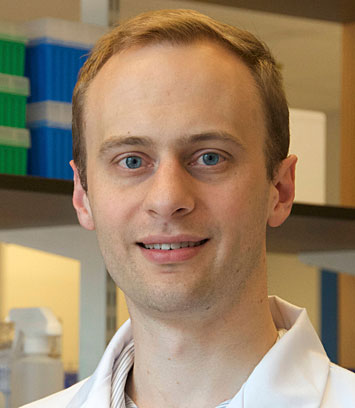BSA Distinguished Lecture on Thursday, 6/8: Preventing Tick-borne Disease by Immunizing Mouse Populations
June 1, 2017
UPTON, NEW YORK—Kevin Esvelt, an assistant professor at the Massachusetts Institute of Technology (MIT), will present a BSA Distinguished Lecture at the U.S. Department of Energy's Brookhaven National Laboratory on Thursday, June 8. Esvelt's talk, titled "Preventing Tick-borne Disease by Heritably Immunizing Populations of White-footed Mice," will be held at 4 p.m. in Berkner Hall.
Bull's eye rashes, swollen joints, and fevers are just a few of the symptoms of the dreaded Lyme disease. While ticks are responsible for infecting people with Lyme disease by transmitting the bacteria Borrelia burgdorferi, ticks aren't born infected. Rather, they pick up the bacteria that cause Lyme disease from the mice they feed on. Now, scientists at MIT see an opportunity to immunize mouse populations against Lyme disease and even against the ticks themselves, potentially preventing tick-borne diseases of all kinds.
During his talk, Esvelt will discuss his lab's work with communities on Nantucket and Martha's Vineyard to prevent tick-borne human illness by developing hereditary traits in mice that could immunize them, removing a vital link in the spread of Lyme disease. Under Esvelt's leadership, the group is working with these communities as they consider plans to release large numbers of engineered mice on a small uninhabited island to assess their ability to reduce the population of Lyme disease-infected ticks, and for an opportunity to spot unexpected ecological side-effects. An independent assessment with positive results for the island communities would lead to a vote on whether to introduce mice on other islands. If successful, Esvelt will explain, heritable immunity could be extended to larger islands and the mainland using a "daisy drive" technology to spread the protective antibodies through local mouse populations.
About the Speaker
Esvelt earned a Ph.D. in biochemistry from Harvard University in 2010 for developing a new method of autonomous directed evolution. He joined the Wyss Institute for Biologically Inspired Engineering as a technology development fellow, where he helped pioneer the development of CRISPR, a new method of genome engineering, and described how it could be used to accomplish gene drive, a way of altering wild populations. He remained there until joining MIT's Media Lab in 2016, where he now leads the Sculpting Evolution research group. He was featured in an article in The New Yorker on Jan. 2.
About BSA Distinguished Lectures
BSA Distinguished Lectures are sponsored by Brookhaven Science Associates, the company that manages Brookhaven Lab, to present topics of general interest to the Laboratory community and the public. These lectures are free and open to the public. All visitors to the Laboratory 16 and older must bring a photo ID.
This lecture is scheduled to be webcast live and archived on WBNL.
The Laboratory is located on William Floyd Parkway, one-and-a-half miles north of Exit 68 of the Long Island Expressway.
For more information, call (631) 344-2345.
2017-12257 | INT/EXT | Newsroom










